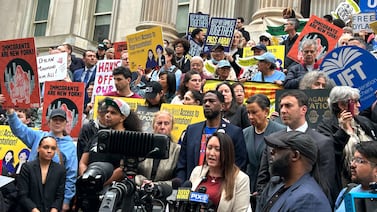Sign up for Chalkbeat Chicago’s free daily newsletter to keep up with the latest news on Chicago Public Schools.
While helping families get services for their child with disabilities, Alexandra Kuske says she has seen school districts slip in language requiring parents to waive their children’s rights to bring claims under state and federal laws.
Recently, one district proposed that a parent waive all claims related to her 12-year-old’s education for the next 10 years in return for a six-month placement at a therapeutic day school, said Kuske, a state attorney at Equip for Equality, a federally mandated protection and advocacy organization for Illinois.
Now, special education advocates from organizations including Equip for Equality, Access Living, and Legal Council for Health Justice are pushing state lawmakers to pass House Bill 2337, which would require school districts to limit waivers to students involved in the mediation process. Under the bill, waivers would have to be “limited in scope and duration and narrowly tailored” to the student’s case.
HB 2337 is in the process of moving through the Illinois General Assembly and currently sits in the House.
Mediation is a cost-effective method to help resolve disputes between local school districts and parents, when a school cannot provide services required in a child’s Individualized Education Program, according to advocates.
Barb Cohen, policy analyst for Legal Council for Health Justice, said mediation agreements contain a section where parents waive the right to bring more complaints about an issue that was resolved.
“If your problem is that your kid didn’t get speech therapy for a year and the settlement is that you’re going to get speech therapy outside school hours twice a week for the next six months, when you sign on to that, you sign also saying, ‘I’m done complaining about how we didn’t get speech services last year,‘” explained Cohen.
However, Kuske and other advocates have recently seen districts put language into agreements that require parents to waive away their right to bring claims against the district related to the Illinois School Code, Title IX, the Individuals with Disabilities Education Act, and other federal and state laws, as well as waiving rights for the child’s siblings.
Many of these parents do not have legal representation. In addition, language in waivers can be difficult to read and parents cannot contest the waiver once signed unless they take legal action, which often costs a lot of money, advocates say. Once these waivers are signed, parents give up the right to make a complaint to the Illinois State Board of Education unless they go to court.
Cohen said some parts of the waiver between school districts and parents might not even be enforceable in court, but it’s hard to tell since going to court is costly.
“Mediation is free. Due process can be free. Going into state court is never going to be free,” said Cohen. “You’re going to need an attorney, so unless you’ve got the money and they know how, doesn’t matter if they’re not enforceable.”
A spokesperson for the Illinois State Board of Education said the state offers mediation to parents and school districts that voluntarily agree to participate. The state board has received 413 mediation requests for the 2025 fiscal year, but not all requests result in a mediation hearing, the spokesperson said. Among the mediations that occur, 71% reach an agreement. However, the state board does not track waivers placed in agreements.
Chicago Public Schools declined to comment on the bill. The district has a Know Your Rights website for parents who have children with disabilities that outlines resources for parents looking for ways to resolve disputes.
The use of waivers have been controversial in other states as well. In December, the New York City education department offered private school students with disabilities vouchers to cover the cost of special education providers but told families they would have to waive their right to file a legal complaint against the city department.
Illinois Rep. Laura Faver Dias, vice chairperson of the House’s education policy committee and sponsor of HB 2337, thinks waivers could come up more often for parents who have children with disabilities as schools try to navigate special education services under the Trump administration, which is seeking to abolish the U.S. Department of Education. Also, it is unclear if there will be cuts in federal funding to support students with disabilities.
“I think this is going to be even more important in this environment as we navigate all of the unknowns,” said Faver Dias. “As a mom of a child with an IEP and another child with a 504 and as someone who taught many students with special needs, we have to protect them.”
Under President Donald Trump’s efforts to dismantle the Department of Education, he recently announced the U.S Department of Health and Human Services will oversee services for students with disabilities. It is unclear how the change will impact state and local school districts.
Secretary of Education Linda McMahon announced mass layoffs earlier this month. The entire staff of the Chicago office of the Office for Civil Rights, which investigates claims regarding special education services, was laid off.
Cohen hopes parents won’t have to choose between an appropriate settlement and signing away their child’s rights in the future. She advises parents to carefully read through their settlements and to contact local protection and advocacy organizations for help navigating the process before they sign a waiver.
Faver Dias said she hopes the bill will help parents who go through the mediation process to receive a waiver that is “more tailored and addresses the issue at hand and isn’t an overreach on the district’s part.”
Samantha Smylie is the state education reporter for Chalkbeat Chicago covering school districts across the state, legislation, special education and the state board of education. Contact Samantha at ssmylie@chalkbeat.org.






